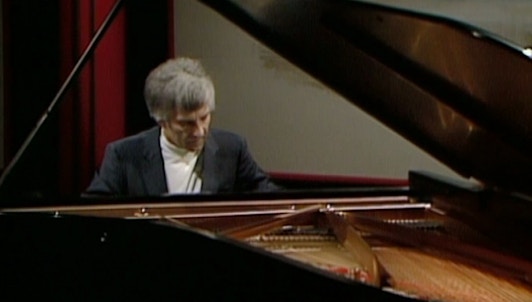That Robert Schumann led a difficult and troubled life is well documented, and much of his work—full of tension, idiosyncrasy, and a remarkable, nearly unparalleled capacity for invention—is notoriously difficult to pin down. Vladimir Ashkenazy, in this season-ending concert from the Royal Festival Hall in 1985, easily untangles all the technical difficulties and navigates the rocky expressive terrain with the flair of a consummate artist—he has studied this music and lived with it, and his attention to detail shines in this exquisitely wrought rendition of two Schumannian masterpieces.
Ashkenazy opens the program with the Papillons, Op. 2, a set of miniatures intended to evoke a masked ball and inspired at least in part by German Romantic writer Jean Paul; in letters, Schumann vacillated on the degree to which Paul’s Flegeljahre informed the themes and motifs of the work. The spirited Papillons give way to the Symphonic Études, Op. 13, a watershed composition in the piano literature—a highly experimental theme and variations brimming with intricate, multilayered counterpoint, liberated from genre conventions, and requiring a virtuosic technical command. Ashkenazy solves the mystery of Schumann, delivering a gold standard interpretation, a “gradual unbuttoning of rich pianistic fantasy … culminating in a magnificent rampage through the dotted-rhythm fiesta of the finale” (The Times).
